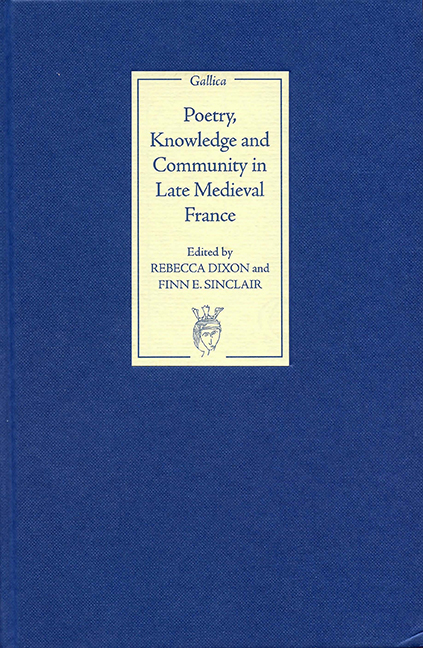Book contents
- Frontmatter
- Contents
- List of Illustrations
- List of Contributors
- Preface
- Introduction: L'Amour de Sophie. Poésie et savoir du Roman de la 1 Rose à Christine de Pizan
- PART I LEARNED POETRY/POETRY AND LEARNING
- Part II Poetry or Prose?
- Part III Poetic Communities
- 10 The Songs of Jehannot de Lescurel in Paris, BnF, MS fr. 146: Love Lyrics, Moral Wisdom and the Material Book
- 11 Refrains in the Jeu de Robin et Marion: History of a Citation
- 12 Le Prince chez Meschinot, mise en forme d'un objet poétique/ politique
- 13 Ways of Knowing in the Songe veritable and Christine de Pizan's Livre de l'Advision Cristine
- Conclusion: Knowing Poetry, Knowing Communities
- Bibliography
- Index
- Miscellaneous Endmatter
13 - Ways of Knowing in the Songe veritable and Christine de Pizan's Livre de l'Advision Cristine
from Part III - Poetic Communities
Published online by Cambridge University Press: 25 October 2017
- Frontmatter
- Contents
- List of Illustrations
- List of Contributors
- Preface
- Introduction: L'Amour de Sophie. Poésie et savoir du Roman de la 1 Rose à Christine de Pizan
- PART I LEARNED POETRY/POETRY AND LEARNING
- Part II Poetry or Prose?
- Part III Poetic Communities
- 10 The Songs of Jehannot de Lescurel in Paris, BnF, MS fr. 146: Love Lyrics, Moral Wisdom and the Material Book
- 11 Refrains in the Jeu de Robin et Marion: History of a Citation
- 12 Le Prince chez Meschinot, mise en forme d'un objet poétique/ politique
- 13 Ways of Knowing in the Songe veritable and Christine de Pizan's Livre de l'Advision Cristine
- Conclusion: Knowing Poetry, Knowing Communities
- Bibliography
- Index
- Miscellaneous Endmatter
Summary
Much human knowledge results not from scholarship but from social exchange, from the talk through which people reach the decisions and make the judgments that structure and regulate groups and communities. In the Middle Ages such talk was known as fama, a polyvalent term denoting both a perceived result or entity, ‘common knowledge’ or ‘public opinion’, that is, ‘what everybody knows’, and a process, ‘what everyone is saying’, and ‘what everyone is saying about what everyone is saying’. In Latin fama was talk, report, or rumour; to be famosus, or famous, was to be much spoken of. Fama denoted both ‘talk’ and ‘knowledge’: talk was knowledge, knowledge was talk, and both were fama. As socially constructed knowledge, something people agreed upon informally or in an organized way, fama could not belong to just one person, although it certainly could have been idiosyncratically inflected. As a force circulating socially, fama about a person existed outside the individual's grasp, and thus managing one's fama would most often have involved the kinds of dispositions and practices that Pierre Bourdieu has called a habitus. This was not merely socially important; as a routine instrument in law courts, one's fama – or ‘commune renommee’ (sometimes simply ‘renommee’) – could determine the outcome of a case, as could the fama about a relevant event.
The legal force of fama is suggested in a reading of the Songe veritable (1406), an anonymous allegorical dream vision in octosyllabic rhyming couplets, a ‘songe politique’ subtitled a political pamphlet by its modern editor. In the poem, a large number of named and historically identifiable officers and servants of King Charles VI stand accused of having impoverished the French people. Their guilt is argued before Everyman [Chascun], who has come to the royal court to learn why he has been deprived of his goods and his livelihood. He is addressed by personifications such as Reason [Raison] and Fortune [Fortune], but also by a pair of less usual figures: Experience [Experience], in whose mirror Everyman can see the truth for himself, and Common Knowledge [Commune Renommee] who, by invoking ‘what everyone knows’, explains to Everyman those things that Experience's mirror cannot show. The existence in the poem of Common Knowledge and other personifications whose names evoke legal procedure (such as Excusasion, the king's magistrate) establish the Songe's juridical, prosecutorial flavour.
- Type
- Chapter
- Information
- Poetry, Knowledge and Community in Late Medieval France , pp. 202 - 214Publisher: Boydell & BrewerPrint publication year: 2008

